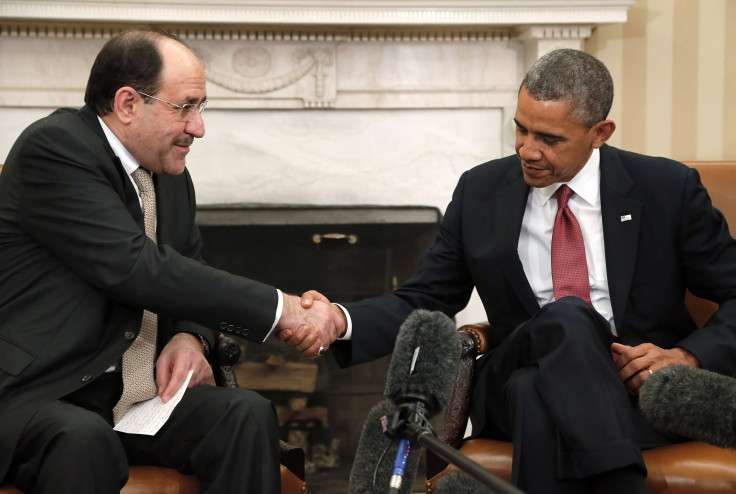Iraqi Prime Minister Maliki Loses US Support

Thursday afternoon at the White House, after President Obama said definitively that he would not send American troops to Iraq, the Wall Street Journal’s Colleen McCain Nelson asked the question on everyone’s mind: “Do you have any confidence in Prime Minister Maliki at this point?”
The president sighed audibly. Then he said, “It’s not our job to choose Iraq’s leaders.”
President Obama may have stopped short of calling directly for Maliki’s ouster, but the message is clear: The United States has had enough of Nouri Kamal al-Maliki, and they want him out. Senators Dianne Feinstein (D-Calif.) and John McCain (R-Ariz.) both said that political reconciliation in Iraq is not possible with Maliki in place, while former Secretary of State (and potential presidential candidate) Hillary Clinton said on CNN:
“I think it’s imperative that the government of Iraq, currently led by Maliki, be much more inclusive, much more willing to share power, involve all the different segments of Iraq. And I believe strongly that, if Maliki is not the kind of leader who can do that, then the Iraqi people need to think seriously about the kind of leader they need to try to unite Iraqis against what is a terrible, imminent threat from these most extreme terrorists.”
Washington’s frustration with Maliki isn’t new, and the prime minister has shouldered much of the blame for Iraq’s deteriorating security situation over the last few years. Maliki has consistently failed to include Sunnis in Iraq’s government, alienating a population that had been so decisive in suppressing an earlier Islamic insurgency. (In an ominous foreshadowing of today’s sectarian nightmare, the Sunni Vice President of Iraq -- Tariq al-Hashimi -- was forced to flee the country in 2012 after Maliki accused him of murder.) And in 2011, Maliki’s refusal to guarantee immunity to American soldiers led Washington to withdraw all U.S. troops from Iraq in December of that year.
But it is Maliki’s inability to repel the Islamic State of Iraq and Syria (ISIS) that may prove to be his ultimate undoing. Following its capture of Mosul, Iraq’s second-largest city, ISIS has quickly obtained control over a wide swath of the country’s northwest, forming a Sunni proto-state together with its holdings in neighboring Syria. In Mosul, Iraqi security forces -- assembled at great expense to both the American and Iraqi governments -- stripped off their uniforms and escaped the incoming ISIS fighters. Many of those who didn’t were summarily executed.
The gravity of the ISIS threat -- and Maliki’s pleading for military assistance -- has finally given Washington enough leverage to remove him. But will it help the situation in Iraq?
There are reasons to doubt that it will. Though installed on the suggestion of the United States in 2006 -- President Bush disliked Maliki’s predecessor, Ibrahim al-Jaafari, and requested his ouster -- Maliki retains a broad base of support in Iraq, where he was just elected to a third term as prime minister. In Iraq’s political system, one in which patronage plays a major role, many government officials owe their careers to him. And if Maliki goes, finding a suitable replacement may not be a simple matter.
For now, President Obama seems willing to wait. On Thursday, he announced that 300 U.S. special forces will go to Iraq to advise Iraqi troops, and but refrained from ordering air strikes (which Maliki has requested). But in the event ISIS continues its penetration into Iraq, Obama did not rule out changing his course -- something that, for Maliki, may mark the end of his rope in Iraq.
© Copyright IBTimes 2024. All rights reserved.






















